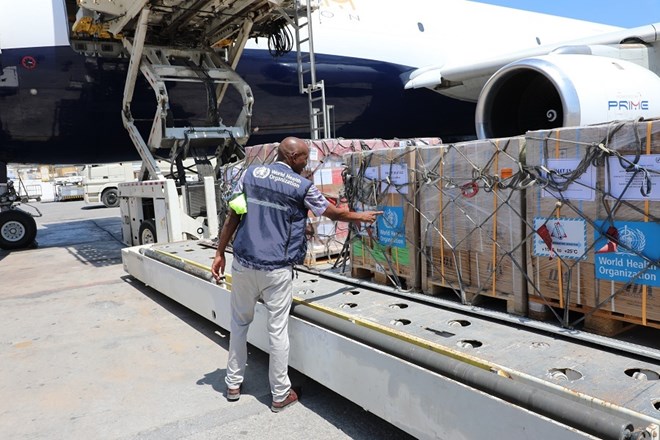
Monday April 3, 2023

Air transportation is the major means of transportation across the country to maintain a medical supply chain across Somalia. Credit: WHO Somalia
Mogadishu (HOL) - The World Health Organization (WHO) has successfully established a functional medical supply chain in Somalia to support vulnerable and disadvantaged populations and build resilience in the health system. WHO airlifted, transported, and stocked over 1,400 tonnes of medical commodities worth around $5 million, which have been crucial in providing basic healthcare and patient consultations to approximately 3.6 million people in marginalized communities.
The supplies have also protected around 3.5 million children under the age of 5 in access-constrained areas against various childhood diseases like polio, measles, cholera, malnutrition, and have provided different micronutrient supplements like vitamin A and deworming tablets to another one million children under the age of 5. WHO is maintaining contingent stocks in three strategically located warehouses in Mogadishu, Hargeisa, and Garowe and opening three additional warehouses in Dollow, Kismaiyo, and Baidoa.
Dr. Michel Yao, WHO Representative in Somalia, stressed the importance of the supply chain system, saying, "A strong and operationally functioning supply chain system will contribute to building resilience in the country, especially in the face of an ongoing pandemic and drought." WHO's success in establishing a functional medical supply chain in Somalia has been widely appreciated. Dr. Yusuf Omar Mohamed, the Head of Pharmaceuticals & Supply Chain Section, praised the organization's efforts.
"WHO supplies are proving to be a lifeline for millions. Everyone wondered how a medical supply chain could work in Somalia, but I believe WHO has shown the world that if there is a resolve to serve humanity, obstacles can be turned into opportunities."
WHO's procurement system for medical supplies includes consultation with Health Cluster partners and the Federal and State ministries of health, which helps ensure that procurements are accounted for and reach the target beneficiaries.
A regular procurement may take up to three months, but in the case of emergencies like the October 2022 twin-blasts in Mogadishu, WHO expedited the process and airlifted trauma kits worth over $1 million from the International Humanitarian City in Dubai within a week after the explosion.